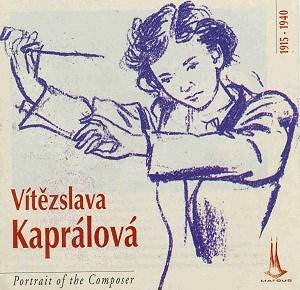The
catalogue of compositions by Vítĕslava Kaprálová
is slender and too easily overlooked. For this reason this 1998
CD from the thoughtful and audacious Studio Matouš company is
musically significant. If its only virtue was significance we
could safely note its existence and pass on through a highway
already thronged with CDs clamouring for attention but it offers
more than that.
The
single movement Sinfonietta has none of the caustic
quality of Weill, nothing of neo-classicism. The main theme has
a surging Hungarian edginess recalling Rózsa. It flies
forward on wings of Olympian exuberance perhaps a little like
Roussel or late Ibert but with lightening romantic voices from
Dvořák and others such as Holst, Butterworth and Vaughan
Williams, surely unknown to her. It is a work in which clarity
of instrumentation is the goal and the achievement. The themes
are yielding and nostalgic in much the same way as Martinů's
works of the 1940s. There are also fastidiously impressionistic
interludes like that at 9.57 where solo instruments chime in delicate
echo of Ravel's orchestral intimacies. The themes are said to
be military in nature but allowing for some tensile writing for
brass at 13.34 belligerence is not a quality I link with this
work; rather is this a work of Mediterranean magnificence.
The
vibrant String Quartet sounds a little more neo-classical
in its first movement contrasting with its successor’s saturated
romantic nostalgia. It is given a superbly lively performance
and recording with some momentary harmonic spice. Once again a
delicate but full-blooded spell is woven in the finale (which
would make a good sampling point. tr.4). Kaprálová stands in the
strong string quartet tradition of Dvořák and Suk. I commend
the work to those still thirsty for more after hearing those classic
works as well as the Janáček.
The
four April Preludes are played by Smýkal.
The recording is not of the best. While clear as a bell the piano
sounds rather like a celesta at times. This is deeply affecting
music commanding a vein of fantasy standing a little between Bax
and Ravel with a dash of John Ireland along the way … if that
is not too outlandish an image. In the tender Ritornell
there is a strong flavour of Martinů in the long
yearning lines for the cello and 'pecked' figuration for the piano.
Kaprálová
studied with Talich and Chalabala (conducting) as well as with
Novák (composition). In October 1937 she went to Paris
to study with Boulanger and Munch. There she also worked with
Martinů and had a love affair with him of which the Love
Carol is a memento. The straight-talking Canteloube or
even Czesław Marek are recalled in the Martinů setting
of the carol. This contrasts with the idyllic melisma and richly
furnished emotions of Kaprálová's approach. The two composers
worked together on a trio for wind instruments and then on the
work that became Martinů's Tre Ricercari. This in
turn inspired Kaprálová to write the Partita
for string orchestra and piano. Martinů had a decisive hand
in the shaping and writing of this work especially in the finale.
The work's central idyll is encased by two busy neo-classical
pieces. The string orchestra here is not as silken-toned as it
might have been and although clarity of orchestration remains
the hallmark this is not a work of the stature of the Sinfonietta.
It will appeal to those who respond to the de Falla Harpsichord
Concerto, the light Dyson concertos (Leggiero, Chiesa, Camera)
and to Martinů's Parisian works of the 1930s. Kaprálová
died young - a victim of illness in the South of France not of
the hostilities.
It
says much for Kaprálová's standing and the strength of her music
that Vilém Přibyl should have recorded Waving Farewell
her song with orchestra. This stands in the great tradition of
romantic scenas. Its contours are roundedly romantic and it is
the most nationalistic of the works here but headily steered by
Ravel's Daphnis and Szymanowski's Song of the Night.
It is a superbly triumphant piece which would grace any singer's
repertoire.
The
notes in both Czech and English generously complement the music.
Discoveries aplenty here of which the quartet, Sinfonietta,
Love Carol, April Preludes and Ritornell are
outstanding. Well worth the quest you will need to make if you
want to find this treasurable CD.
Rob
Barnett
